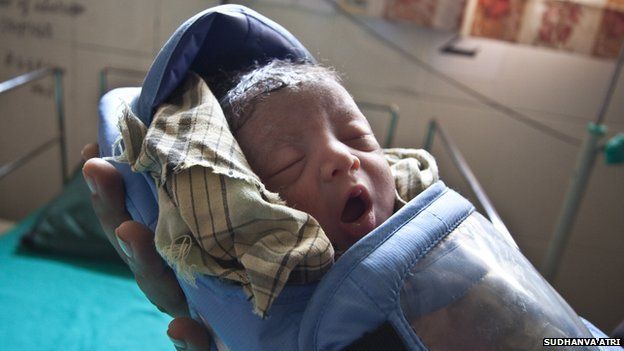The entrepreneurs helping girls in the developing world
- Published

With an estimated one million premature babies dying around the world each year, entrepreneur Jane Chen was determined to help reduce that number.
As maintaining a premature baby's body temperature plays a vital role in helping to keep it alive, Ms Chen's business - Embrace Innovations - has developed two low-cost baby warmers.
Aimed specifically at mothers and hospitals in the developing world, the warmers are proving to be an effective, significantly cheaper alternative to expensive baby incubators.
The firm's most basic product, the Embrace Care, does not require any electricity. Instead, a wax-like pad is heated using hot water, and then transferred to a specially designed baby-sized sleeping bag.
It can then keep its heat at 37C for eight hours. Meanwhile, a sister product works in the same way, except that the pad is first heated by mains power.
With offices in Oakland, California, and Bangalore, India, Ms Chen's business is one of 13 small firms from around the world that have been chosen to be provided with business support by a new initiative called the Girl Effect Accelerator (GEA).
The fact is that a woman, no matter how poor, or impoverished, or uneducated, will do absolutely anything to save her children.
Launched at the end of last year, GEA is run by the Nike Foundation, the charity arm of sportswear giant Nike, and Colorado-based business-support organisation, the Unreasonable Group.
GEA was set up specifically to help boost small firms (run by both women and men) that are helping to improve the lives of the 250 million adolescent girls around the world that the United Nations estimates are living in poverty.
The founders of the first 13 firms to be supported by GEA attended two weeks of talks and workshops in California at the end of last year, and will have continued access to 20 established business mentors.
And while GEA does not directly invest in any of the companies it is also helping to introduce the businesses to potential investors.
'Powered by love'
Embrace Innovations was picked by GEA because its product could help the vast number of teenage girls who give birth in the developing world.
About 16 million girls aged 15 to 19, and some one million under 15, give birth every year, mostly in lower income countries, according to the World Health Organization (WHO).
Ms Chen, 36, and her co-founders first started work on their baby warmers while studying design at Stanford University near San Francisco.
The product was then further developed on the ground in India, where Ms Chen lived for four years, before the product was released onto the market in 2008.
The basic warmer costs less than $300 (£200), and while sales figures have now been released, Ms Chen says it has helped more than 150,000 babies so far.
"If you think about infant mortality, who is the most motivated person to save their baby? It's mothers," she says.
"The fact is that a woman, no matter how poor, or impoverished, or uneducated, will do absolutely anything to save her children.
"It's really this love that powers our technology."
'Mindset shift'
Another of the businesses being backed by GEA is India-based Ayzh, which sells a clean birth kit, a small pouch containing a number of sterilised items.
The business was set up in the city of Chennai in 2010 by young female entrepreneur Zubaida Bai, with the aim of preventing infections during and after childbirth.
Ayzh has now sold 100,000 of its clean birth kit, which costs $3, and last year the business expanded overseas into a number of countries in West Africa.
Ms Bai, 34, says that companies such as her own, with the support offered by GEA, are helping to challenge the mistaken belief that only charities can assist people living in poverty.
She says that poor people in the developing world, and specifically adolescent girls are instead a big, untapped market, offering many opportunities for entrepreneurs who are willing to take them.
"People don't believe that the poor can pay for what they need," she says. "I think that is the huge mindset shift that needs to happen now."
Knock-on impact
A third business backed by GEA is Kenyan firm ZanaAfrica, which makes low-cost sanitary pads.
The company was set up in Nairobi in 2008 by US expat Megan White Mukuria.
The 37-year-old moved to Kenya in 2001 to work for development organisations upon graduating from Harvard University.
She set up ZanaAfrica after realising that as many as 65% of teenage girls in Kenya could not afford to buy sanitary pads, and that this was having a knock-on impact on their education.
"Girls start missing school when they start their periods," says Ms White Mukuria.
"Or if they're participating in the classroom they're not actually engaged. So they start falling further and further behind."
With a pack of disposable sanitary pads typically costing about $1 in Kenya, Ms White Mukuria was determined to bring out a much cheaper version.
Keeping costs to a minimum, and accepting a much lower profit margin than the big producers, ZanaAfrica sells packs for a quarter of the price.
Ms White Mukuria says that its pads, and the health education ZanaAfrica also provides, are the tools it is using to help alleviate poverty among adolescent girls.
"But ultimately, the tools for the sustainable eradication of poverty are the girls themselves, empowered and educated," she adds.